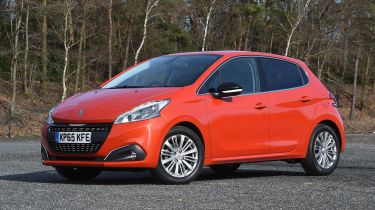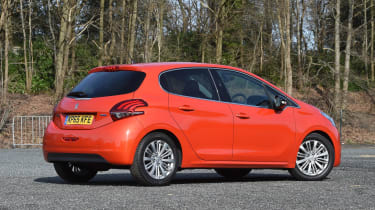Used Peugeot 208 (Mk1, 2012-2019) review
The Peugeot 208 Mk1 is a stylish supermini with good equipment levels and efficient engines, but some alternatives are nicer to drive
Verdict
If you’re especially after a stylish used supermini, then there are certainly worse options out there than the Peugeot 208 Mk1. Better still, the Peugeot’s positive attributes are more than skin deep, as the 208 Mk1 is a pleasantly well-rounded car. Fuel economy in particular is very good across the board, and all bar the slightly sparse entry-level models were nicely equipped as standard. A roomy cabin and a decent-sized boot made the 208 Mk1 pretty practical for a supermini, too, even if some alternatives are better still for practicality. A similar story can be said for the way the Peugeot 208 Mk1 drives. While it’s still an enjoyable steer, the 208 Mk1 wasn’t the last word in comfort or ride quality by small car standards, and the Peugeot wasn’t able to beat the likes of the Ford Fiesta for fun handling, either.
Which one should I buy?
- Best Peugeot 208 Mk1 for families: 1.2 PureTech 110 Allure manual
- Best Peugeot 208 Mk1 for fuel economy: 1.6 BlueHDi 75 Active manual
- Best Peugeot 208 Mk1 for performance: 1.6 THP GTi by Peugeot Sport manual
The Peugeot 208 Mk1 went on sale in the UK in June 2012, and buyers had a fair few options and configurations available to them from launch. From the moment the order books opened, the 208 Mk1 could be specified with one of five petrol and two diesel options, and was available in three-door and five-door bodystyles. The trim level selection was pretty broad, too: there was an entry-level Access grade, plusher mid-range Access and Allure trims, a range-topping Feline spec and a limited run Ice Velvet launch edition grade.
Used - available now
Later after launch, the Peugeot 208 Mk1 gained new variants that were more catered towards performance car buyers. In February 2013, a 208 GTi hot hatch with a 200bhp 1.6-litre petrol engine joined the range, and a sporty XY trim level joined the 208 Mk1 range a few months later to bridge the gap between the regular model and the GTi.
In June 2015, the Peugeot 208 Mk1 was given a mid-life facelift, which refreshed the supermini with revised styling, extra safety equipment, a sporty GT-Line trim level to sit at the top of the range and the addition of new technologies such as a touchscreen display and Apple CarPlay and Android Auto compatibility on most models. In November 2014 Peugeot launched the limited edition 30th Anniversary version of the 208 GTi (which would later be revived in-all-but-name as the series production 208 GTi by Peugeot Sport), and the diesel range be condensed down to a 1.5-litre line-up by summer 2018. By August 2019, the Peugeot 208 Mk1 would be replaced by the second-generation 208 supermini.
For long-distance drivers, the diesel engines make the most sense, because they return the best fuel economy. Still, the petrol engines make the most sense, with the 1.2-litre PureTech turbocharged petrol engine offering a good sweet spot with its good fuel consumption and peppy performance. One engine we’re less inclined to recommend is the entry-level 68bhp 1.0-litre petrol: while it’s very economical on paper, the performance isn’t great, so it only makes sense if you drive in built-up areas only.
Specification-wise, the Peugeot 208 Mk1 is well equipped across the board for the most part. All trim levels from the mid-range Allure model and up come with a handy selection of creature comforts, and this remains the case on pre- and post-facelift cars. The entry-level Access trim level is a little bit sparse on features when compared with the other specs, though, and the 2015 facelift did introduce some more modern amenities that weren’t available at the 208 Mk1’s launch.
What are the alternatives?
When it was a brand-new car, the Peugeot 208 Mk1 had lots of rivals to fend off. As a result, you also have plenty of alternatives to consider when you’re shopping around for a second-hand supermini of a similar age.
Key rivals include the Vauxhall Corsa, which is cheap to run, spacious and come with good equipment levels. Similar qualities are shared with the Ford Fiesta, which also throws into the mix fun handling.
Other highly rated superminis to have on your radar include the spacious Renault Clio, the comfort-oriented Citroen C3, the easy-to-drive Skoda Fabia and the sporty-to-drive Mazda 2 and SEAT Ibiza. If a classy cabin is a key priority, you may want to consider the Volkswagen Polo, and there are also the premium Audi A1 and DS 3 to bear in mind if your budget stretches far enough.
Additionally, the Hyundai i20 and Kia Rio are worthy of a mention. While they’re not as stylish as the Peugeot 208, they do come with a good amount of equipment for the money. Both cars also came with long warranties (up to five years for the Hyundai; up to seven years/100,000-miles for the Kia), so older examples may still have some manufacturer cover to fall back on.
Rivals for the 208 GTi hot hatch aren’t as varied as the competitors for the regular 208 Mk1, although there are still a few to keep on your radar. Chief alternatives include the Ford Fiesta ST, the Toyota Yaris GRMN, Vauxhall Corsa VXR, and the Volkswagen Polo GTI.
Peugeot 208 vs Volkswagen Polo

In our efficient supermini duel from April 2016, we put the fuel-sipping diesel version of the Peugeot 208 Mk1 up against the petrol-powered BlueMotion variant of the Volkswagen Polo. We were impressed with the Peugeot’s fuel economy, but felt the Polo BlueMotion was the better overall car because it was more refined, cost less to run and felt more upmarket inside than the 208 Mk1. Read the full test...
Peugeot 208 GTi vs Toyota Yaris GRMN
For this hot hatch head-to-head from April 2018, the peppy Peugeot 208 GTi was pitted against what was at the time the feisty new kid on the block: the limited-run Toyota Yaris GRMN. We decided to crown the Peugeot 208 GTi the victor, with its great blend of fun handling and affordability. Read the full test...
Peugeot 208 vs Hyundai i20 vs Mazda 2
The then-freshly facelifted Peugeot 208 Mk1 went up against the Hyundai i20 and Mazda 2 in our three-way supermini group test from July 2015. Despite all the changes and the impressive fuel economy, other factors such as the sub-par refinement and rough diesel engine meant the Peugeot 208 Mk1 wasn’t able to beat the Hyundai or the victorious Mazda. Read the full test...












